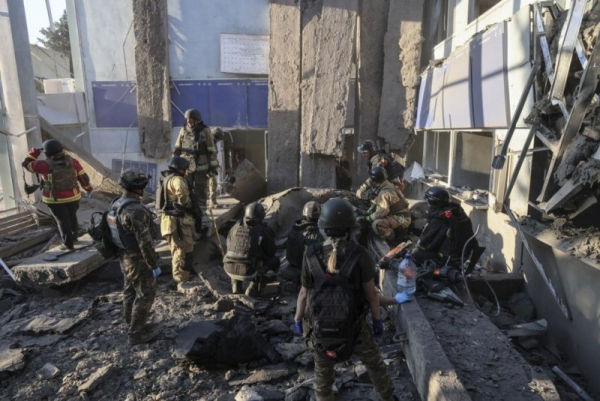Another baked Alaska — Trump and Putin


Ukrainian rescuers and policemen work at the site of the Russian strike on a bus station in Zaporizhzhia, Ukraine, on Monday. At least 19 people were injured after a Russian guided aerial bombs attack, according to the Zaporizhzhia Regional Military Administration. Photo by Oleg Movchaniuk/EPA
Presidents Donald Trump and Vladimir Putin will hold an Alaskan summit over Ukraine on Friday.
The last U.S. summit held in Anchorage was between U.S. Secretary of State Antony Blinken and Chinese Foreign Minister Wang Yi in March 2021. It turned into a public spectacle, with both sides firing off angry charges and counter-charges. Will this summit be more productive?
One way to anticipate the possible outcomes is through considering a series of binary choices. Either one or both sides will leave the conference having achieved nothing, much like Trump being unable to persuade North Korea’s Kim Jung Un to denuclearize in June 2018 in Singapore. Or there will be an agreement of sorts or an agreement to agree in the future.
Regarding any agreement, Munich 1938 and British Prime Minister Neville Chamberlain’s “peace in our time” will not easily be forgotten should Trump yield to Putin’s demands.
Far more relevant was Trump’s 2020 Doha Agreement with the Taliban that excluded the presence of the Afghan government and indeed led to the fall of the Ashraf Ghani administration in August 2021. In fact, it can be argued that Trump has carefully laid the framework for abandoning Ukraine and its feisty president, Volodymyr Zelensky.
Trump’s first meeting with Zelensky in the White House was an ambush. Zelensky was accused by Vice President JD Vance of not expressing sufficient gratitude for U.S. aid and support. Trump’s views softened. But currently, he has given every indication that Zelensky must cede territory to Russia in any cease-fire or peace agreement.
More importantly, Trump has shifted the entire burden to NATO and the European Union of keeping Ukraine supplied with weaponry and money to sustain the war. The United States will happily sell its defense equipment to Europeans, who in turn will provide it to Ukraine.
To America Firsters, this is brilliant. To many in Congress and in the public, it is an abandonment of an ally and a deeply flawed concession to Putin that the West will come to regret.
But the crucial questions are what do both presidents see as outcomes from this meeting? What is each prepared to concede? And what does this mean for the ending of the war and the killings Trump says he hates so much? Surprisingly, Putin’s aims are clearer and are keeping with Lenin’s strategy of “other means.”
In simple terms, “other means” means that Putin is prepared to accept less than a full measure of his demands. That suggests he will retain Crimea while accepting certain “land swaps” of Ukrainian for Russian territory. Keeping Ukraine from joining NATO will be part of his terms although, Putin could accept the prospect of EU membership, as that will not be relevant given his likely next steps.
Obviously, the United States and West must provide security guarantees to maintain Ukraine as a sovereign independent state. Here the record is bleak. Neither the 1996 Budapest or the 2014/15 Minsk Agreements that provided for Ukraine’s security worked — all having failed miserably.
Putin understands this. In the event of an agreement, Russia will pursue “other means” to gain greater control of Ukraine politically and even territorially. And Putin also could wait while his military is restored before launching a future reattack.
From Trump’s perspective, walking away from Ukraine could make perfect sense. Trump has gone, in his mind, above and beyond trying to end the war. He has patiently negotiated with both sides. And despite his election promise to end the war in 24 hours, he will claim that was a purposeful exaggeration. Finally, having convinced Europe to become the ultimate supporter of Ukraine, Trump can argue he has done all he can. Now it is up to the warring factions to end the war.
Game, set and match — or not. Still, Trump could take a harder line believing that if Putin is not stopped in Ukraine, Western Europe is next. However, it would be in Trump’s interest if he recognizes that Putin lacks the reasons and the forces for an attack to the west and will not risk war with a far superior NATO military. If Trump reaches this conclusion, it reinforces why the United States need not be engaged any more in the Ukraine fight.
Left unsaid are sanctions. Would Trump accept pressure from Congress and 85 senators to impose sanctions on Russia and secondary sanctions on China? Probably not. But we shall find out later this week when or if the Ukraine war ends.
Harlan Ullman is UPI’s Arnaud de Borchgrave Distinguished Columnist, senior adviser at Washington’s Atlantic Council, chairman of a private company and principal author of the doctrine of shock and awe. His next book, co-written with Field Marshal The Lord David Richards, former U.K. chief of defense and due out next year, is Who Thinks Best Wins: Preventing Strategic Catastrophe. The writer can be reached on X @harlankullman.